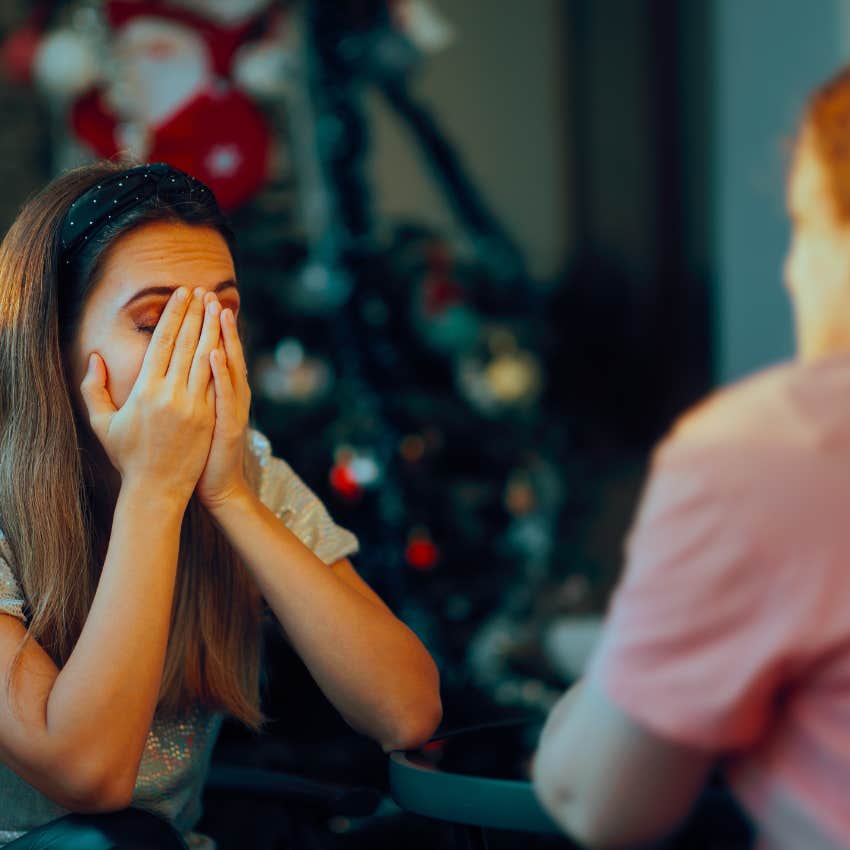15 Unhelpful Phrases Mindless Folks Say Way Too Often To People Who Are Depressed
They may sound kind, but these phrases usually only make depressed people feel worse.
 Jay Soundo | Unsplash
Jay Soundo | Unsplash Because I've been depressed for such a long time (nearly half my life), I've heard a lot of "helpful" things that have sent me spiraling even deeper into depression. While in the midst of mental turmoil, I've been given advice that sent my irrational brain even further into despair. I choose to believe that the people who say these things mean to make me feel better about my depression, but it certainly doesn't work.
There are some things you should definitely, absolutely, positively, not say to someone who's depressed. I'm not an expert, and I can't speak for everyone, but these are fifteen things that I never want to hear and what I wish I could say in response.
Here are 15 unhelpful phrases mindless folks say way too often to people who are depressed:
1. 'You're not the only one'
So you're telling me that not only is my pain insignificant because others feel it too, so I should just get over it, but also that other people feel this bad? That sucks. That really, really sucks. Now I'm sad for myself and sad for other people.
A person who feels invalidated is less likely to open up again. Dismissing their feelings erodes trust and damages the relationship, as they may decide it's not safe to share their struggles with you. Research recommends giving the person a safe space to express their feelings without fear of being told they are overreacting.
2. 'You're just going through a phase'
 Nicoleta Ionescu / Shutterstock
Nicoleta Ionescu / Shutterstock
A phase that's lasted literally more than 10 years? That's a freaking long phase. That's basically my whole life, so my whole life is "just a phase?" Good to know. Thanks so much.
When people's feelings are minimized, they are left feeling misunderstood and can begin to doubt their own experiences. Research on young people found that the fear of stigma and rejection led many to keep their depression a secret, which had long-term negative effects like loneliness and isolation.
3. 'But you have so much to be thankful for'
I'm definitely not wracked with guilt over the fact that my life on paper is great, but I still hate everything. Depression is a disease, guys. It's not a state of thanklessness, and it can't be cured by throwing my blessings in my face. I know they're there, in my head at least, but that doesn't mean they can stop these feelings.
4. 'Why are you depressed?'
Honestly? I don't know. It could be the chemicals in my brain going haywire or bad genes. My depression just sort of happens like an illness because that's what it is, you know, an illness.
This question often stems from a misunderstanding of depression as a choice or a weakness instead of a complex illness. Research shows that people with depression often worry about being misunderstood or judged, so directly asking "why" can shut down communication and worsen their condition.
5. 'You're stronger than this'
Am I, though? Because I don't feel like it. What I feel is my head growing heavy on my shoulders, my legs trembling, and my spine buckling. I feel my insides collapsing. I feel everything that's ever held me up disappearing. I feel weak. Maybe I should be strong. Maybe if I were stronger, I wouldn't be sad.
An excessive and ineffective stereotype of a happy, optimistic mindset discourages the expression of any negative emotions. This forces individuals to suppress their feelings, preventing them from addressing the underlying issues that need attention.
6. 'Just push through it'
I literally can't. When I'm depressed, I can barely hold my head upright, and it feels like everything is crashing around me and my life is going up in flames. But you know, I'll guess I'm trying to just push through.
For someone already struggling, being told to "try harder" can be extremely discouraging and may lead them to feel their situation is hopeless. Let them know you are there to listen without judgment, even if you don't fully understand.
7. 'You just need to pray, read the Bible, and go to church more'
How's that working out for your broken leg, huh? Has it spontaneously healed because you went to church? No? I didn't think so. I do pray, and I do read my Bible, and I do go to church, and I honestly believe that's why I'm still alive. Period.
Framing depression as a sign of spiritual weakness, or insufficient faith, can lead to intense shame. Studies have shown that when religious practices are associated with feelings of guilt, fear, or unworthiness, they can worsen distress, anxiety, and depression.
8. 'If you just had faith, this wouldn't be happening'
If you think faith equals instant healing, you need to go take a theology class. Ever heard of Paul the Apostle?
People might internalize the message that their depression is a sign of spiritual weakness, which can increase feelings of guilt and inadequacy within their faith. This can prevent them from seeking the very spiritual and community support that can help them.
9. 'Just think positively'
Okay, positive thinking. I can do that. It's sunny today. That's positive. The sun is shining, the sky is blue. Blue. Blue is the color of sorrow.
Why is the sky sad? I'm sad. Why am I sad? I shouldn't be sad — the sun is shining and the sky is blue! But mostly, everything sucks, and now I'm even sadder because apparently, the sky is sad too.
10. 'Stop taking your medication'
The last time I just stopped taking my medication, I spent a week in a psych ward, and I'm still trying to figure out how I'm going to pay that bill. Shut up, civilian.
Research has shown that abrupt discontinuation can lead to withdrawal effects like flu-like symptoms, anxiety, and sleep problems. Discontinuation of any psychiatric medication should be done under the supervision of a healthcare professional who can help the individual taper off the medication slowly and safely.
11. 'Just be happy'
Just be happy? How did I never think of that? I'll just go into my brain and flip on the happy switch! This is so great. Life-changing advice, truly.
Depression is not a simple matter of a bad mood but a serious illness that requires treatment. Statements like "be happy" can lead to feelings of guilt, shame, and isolation for the individual. Placing excessive pressure on happiness can be counterproductive, as the extreme valuing of happiness is linked to depression, one study found.
12. 'Don't talk about it too much, you'll bring people down'
 BongkarnGraphic / Shutterstock
BongkarnGraphic / Shutterstock
I already knew that. I know that people don't want to hear about depression, and your reminder is just going to make me isolate myself even more. Also, if you don't want to hear me talk about my depression, please don't talk to me about how hard your job is or how awful your breakup was. A friendship is a two-way street.
When a depressed person feels they cannot open up, they might withdraw from social interactions. Openly discussing feelings and seeking support is a critical step in managing depression, a 2023 study suggested. Discouraging this can hinder their ability to seek help and can lead to a vicious cycle of non-recognition and isolation.
13. 'Stop whining'
I'm not whining, just like someone groaning in pain because of a broken limb or cancer eating their body isn't whining. I'm expressing my pain like I have every right to do. And further, whining implies that the problem is inconsequential. I'd like to see you spend one day in deep depression and call it inconsequential.
Invalidation can deteriorate trust in relationships, as the person feels let down by those they thought would understand and offer support. It's important to remember that supporting a loved one with depression is emotionally demanding. It is important to set boundaries and find time for your own well-being to avoid burnout.
14. 'Depression is a first-world problem'
I know that other people have it worse. I know that other people are starving and in physical pain and in war zones. But my mind is a war zone, and it's making my life impossible, and it is never okay to minimize someone's problem because someone else, somewhere else, has it worse. That. Is. Never. Okay.
Labeling depression this way is an example of the fallacy of relative privation, which argues that a person's problem is unimportant because others may have it worse. This dismisses the individual's legitimate distress and emotional pain by comparing it to the possible physical suffering of others.
15. 'Just exercise and eat healthily'
No, okay, you're right — this is valid advice. I should eat better and work out. But that's not going to heal me straight-up, first of all, and secondly, it took every ounce of strength to get out of bed this morning.
Then, I used coffee fumes to get in the shower so I don't assault your nostrils with my scent. Now I'm sitting on the couch, and I know I have to go to work, but I'm not sure how I'm supposed to work out when I can barely gather the energy to get out of bed.
This is a catch-22: yes, it'll make me feel better, but I need to feel better to do it. Reminding me is just going to make me feel worse unless you're offering to go with me for a walk or a run.
If you do want to say something to someone battling depression, there are plenty of ways to be supportive. These phrases include:
"I love you."
"I'm sorry you're having a hard time."
"Let's go get ice cream?"
"I'm here for you."
"I'll pray for you (or send positive thoughts if that's your deal)."
"Let's go get some sunshine."
Or tell your loved one that you don't know what to say, but you want to reassure them that you're here for them. Tell them that it might not be okay, but you'll stand by them.
If you or somebody you know is experiencing a mental health crisis, there is a way to get help. Call SAMHSA’s National Helpline at 1-800-662-HELP (4357) or text "HELLO" to 741741 to be connected with the Crisis Text Line.
Karis Rogerson is a freelance writer and author who has an MFA in Writing for Children and Young Adults from Vermont College of Fine Arts, and in the summer of 2024, she was a Lambda Literary fellow for YA.

